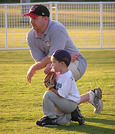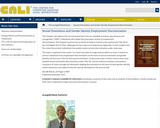
- Subject:
- Psychology
- Social Science
- Material Type:
- Module
- Date Added:
- 07/10/2017


By the end of this section, you will be able to:Understand basic biological mechanisms regulating sexual behavior and motivationAppreciate the importance of Alfred Kinsey’s research on human sexualityRecognize the contributions that William Masters and Virginia Johnson’s research made to our understanding of the sexual response cycleDefine sexual orientation and gender identity

In this lesson, teachers will describe how puberty prepares human bodies for the potential to reproduce as well as the process of human reproduction with the aid of a PowerPoint presentation. Teachers should review information learned last class while going through slides and questioning the students on what they recall. Teachers explain to students that all of the changes they experience during puberty are due to a new surge of hormones that both females and males experience, often differently. Teachers will also discuss the process of human reproduction by describing the steps needed to conceive a baby. The last activity has students create a diagram of the steps of conception in the right order for teachers to assess what they have retained from the lesson. All mistakes should be reviewed and corrected by the teacher, and then end the lesson with an open-discussion for question.

This lesson explains reproduction to students using a PowerPoint presentation and includes a teacher’s resource with sample definitions and language that can be used. Students then receive cards and try to arrange themselves in the correct order of a 28-day menstrual cycle showing where sperm would need to be present in order for a pregnancy to occur as well as how methods of contraception can prevent pregnancy. The homework is watching a short video about pregnancy myths and answering questions on a worksheet.

Students will explore gender expression, gender identity, sexual orientation, and gender stereotypes. Students will discuss such topics as a safe space, demonstrating respect, and making assumptions based on expression

Students will learn about respecting the gender expressions of themselves and others through short story scenarios. Students will collaborate and design alternate and respectful endings to the scenarios.

In this lesson we read a book called, Some Secrets Should Never Be Kept, a story about a young person who is touched inappropriately and is told to keep it a secret. We talk about how feelings and emotions can be signals to us, sometimes they’re letting us know something in our world doesn't make sense and we might need help figuring it out. We also talk about the way people sometimes use their power and position to manipulate situations to their advantage and to keep their victims silent.

In this lesson students use the co-created process grid and their journal to create a collage using visuals and words from magazines to illustrate and celebrate all aspects of their identities, with the invitation to include gender expression and gender.

The Sex Ed Open Learning Project User Guide provides background information and tips for navigating the collection.

We begin by defining sex, communicating to students that sexual contact can come in diverse forms, all of which require consent. Students learn about sexual reproduction as well as alternative modes of conception/family planning. Students end the lesson learning about contraception methods and the variety of ways they can choose to use to prevent pregnancy.

Define and differentiate between sex and genderDefine and discuss what is meant by gender identityUnderstand and discuss the role of homophobia and heterosexism in societyDistinguish the meanings of transgender, transsexual, and homosexual identities

By the end of this section, you will be able to:Understand basic biological mechanisms regulating sexual behavior and motivationAppreciate the importance of Alfred Kinsey’s research on human sexualityRecognize the contributions that William Masters and Virginia Johnson’s research made to our understanding of the sexual response cycleDefine sexual orientation and gender identity

This Chapter will address the current protections that are available to lesbian, gay, bisexual and transgender (“LGBT”) individuals who allege they have been victims of employment discrimination. The Chapter’s primary focus will be on federal statutory law, particularly Title VII of the Civil Rights Act of 1964. Although the focus here is on federal law, Appendix I to this Chapter lists the states that protect individuals from public and/or private discrimination under state laws.
This topic is explored in four parts: (1) a brief overview of congressional efforts to enact a statute to protect individuals from employment discrimination on the basis of sexual orientation and gender identity; (2) discusses Title VII and sexual orientation; (3) discusses ways in which recent courts have handled sexual orientation discrimination under Title VII; and (4) similarly examines early judicial treatment of claims brought by individuals alleging discrimination on the basis of their gender identity and/or expression and explores how the law has developed in this area as well.

This lesson defines sexual intercourse and the cells involved with reproduction (sperm and egg) using an AMAZE video. It also includes a discussion of how pregnancy can happen via other methods as well. Using a small group activity, this lesson also examines the economic reality of accessing reproductive health care and how economic disparities impact who can and cannot utilize these methods. This information sets the foundation for understanding a basic physiological process and underpins future lessons about pregnancy prevention.

In this lesson students will review what identity means. They will participate in an identity circle and fill in an identity worksheet.

This lesson seeks to engage in discussions about relationships, emotional, and physical relatedness, and whether biological connections are the only connections that make a family. Understanding how society has traditionally defined family may not be the way we define it – and that’s okay. In this lesson, participants will expand their knowledge of a more involved family tree. When it comes to describing family/kinship, does a biological connection hold more weight, or do emotional connections that develop over time hold equal importance? Understanding relationships, values, and what resonates as important is helpful in practicing and engaging critical thinking skills.